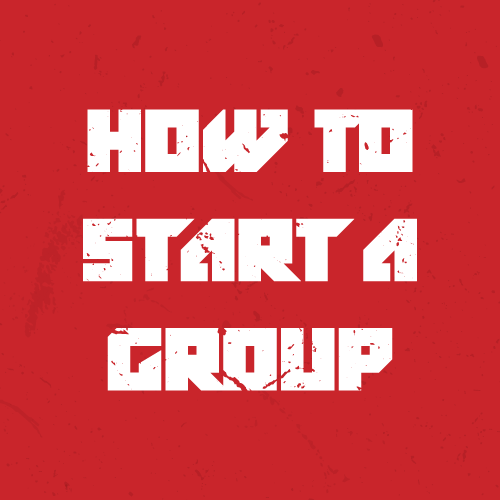How Do I Join an Equipped Group?
Equipped Groups FAQ
What is the purpose of an Equipped Group?
These groups are designed to equip members with both content and a context for deeper discipleship as explained above. The content is found in our recommended resources on Theology, the Bible, and Spiritual Disciplines (found at ashland.church/equipped). The resources for these groups range from deep theology to practical guidance. All of these book/resources are meant to challenge us to pursue a deeper level of discipleship.
Equipped Groups and disciple-making
We believe that when done well, Equipped Groups not only carry out the task of discipleship but also lead to disciple-making. In Matthew 28:18-19, we are called to make disciples who make disciples. Equipped Groups provide an intentional context for disciple-making on a personal level. As you are equipped in groups, our prayer is that you would seek to equip others by starting and leading new groups. As this process continues, a culture of discipleship is cultivated in our church.
Who should lead an Equipped Group at Ashland Church?
Any member of Ashland Church can lead an Equipped Group.
Our members agree to covenant membership. This covenant includes the commitment to uphold our doctrinal statements and not teach contrary to our doctrinal convictions as explained in the Baptist Faith and Message 2000. Obviously, anyone who is associated with our church could form a study in any of these areas. Because of the accountable nature of church membership, however, we recommend that our Equipped Groups be led by members.
Who can participate in an Equipped Group at Ashland Church?
While only members can lead an Equipped Group, anyone can participate. This guide is to assist anyone in our church who has a passion to study, lead, and encourage others into a deeper level of discipleship. We pray this resource helps create a culture of discipleship where many feel the freedom to use their gifts to lead others for the health and well-being of our church.
Why are the groups limited to 4 – 6 people?
We believe that intentional discipleship happens in the context of relationships. Smaller numbers of people are able to process the information while getting to know one another and holding one another accountable in a meaningful way. We pray that these studies form gospel friendships that lead to even deeper accountable discipleship in the context of our church.
Why are the groups gender-specific?
We believe that discipleship for both men and women begins in gathered worship with the church body. Through the ministry of the Word in worship, the whole church is discipled or equipped together as witnesses for our mission. Furthermore, our BFGs provide the needed fellowship around the Bible where men and women are together in an intentional community.
However, similar to the way smaller groups allow for discipleship in the context of relationships, gender-specific groups provide a context to not only learn but to be challenged in specific ways as men and women were created to be different, each as image bearers for God’s glory in the world.
When and where do the Equipped Groups meet?
The time and place is determined by the leader of each group. We encourage the time, place and duration of the study to be firmly set each week for consistency.
How long should each Equipped Group last?
We suggest each leader make a hard and fast start date and ending date. We recommend that no study last more than six to eight weeks depending on the content. If the content is extensive and could require more than 8 weeks, we would ask that you break the content into parts and take brief breaks (2-3 weeks) between each part.
What is the level of commitment?
We want to aim for a high level of commitment with each Equipped Group. We encourage each leader to make clear the commitment it takes to work through the content. Each leader will be responsible to hold the group accountable for attending every meeting and ultimately finishing the study.
Do I have to use the recommended books?
The recommended books have all been carefully chosen by our pastor(s) and church leadership. The list is made up of trusted resources that we believe will equip us theologically and guide us practically in our mission as a gospel-centered church seeking to make disciples of all nations. While there are many more good resources available on the given subjects, we have chosen to limit our content to the recommended book lists. We believe there is more than enough here to cover whatever topic you might be interested in.
Furthermore, the content of these books is meant to be deep and challenging. We want to love the Lord with our mind, heart, soul, and strength. To do this, we need to be committed to digging deep and being directly challenged by the material.
Do I have to follow the Equipped Path in order?
While annually we suggest that every person goes through at least one study in each of the areas of (1) Theology (2) Bible Study (3) Spiritual Disciplines, there is no specific order that you would have to follow each year.
Do I have to only study with the same group of 4-6 people?
Not at all. Schedules change. Circumstances lead to different levels of involvement throughout the year. While too much change in a group could lead to ineffectiveness, we do encourage you to offer the opportunity for others to join as needed.
What if I already have a discipleship group?
If you are already meeting with others for accountability and discipleship (e.g. fight clubs, etc.), only change your format and content if you feel this approach would better serve you. Equipped Groups should be seen as a tool and resource for discipleship.
For more information on how to start an Equipped Group, continue reading below.
How Do I Start a New Group?
Steps to Starting a Group
- Pick a book or resource that you are excited about digging into. If you are uncomfortable in leading, consider approaching someone you’d like to work through the material with and ask them to lead.
- Fill out an online New Equipped Groups Request Form. Communicate with church leadership your interest in leading a study. They will be able to help you promote, if needed, and possibly connect you with others interested in this topic. Once your study is developed and you begin to recruit participants, the study will be listed with other studies.
- Break the book’s content up into sessions of 6-8 weeks. If there is enough content break it up into parts that will be covered in more than one 6-8 week period. Make sure the length of the study does not overwhelm others as you recruit them. Your goal should be to successfully get through all of the material while also not wearing participants out to accomplish it.
- Plan meeting times according to your schedule. Pick a time that is immovable within your schedule. Allow others to decide going in if your meeting time fits with their schedule or not. If you are too flexible or looking to only accommodate others you will eventually find yourself constantly moving times and dates. The goal is to not cancel or reschedule. Adjusting the meeting times should only be a last resort.
- Recruit group participants to study the content of a book with you. While there will be generic church-wide appeals for others to be involved, the primary responsibility to form the group falls on the leader. You can recruit from within your BFG or a group of friends you have in the church. (Equipped Groups are not limited to members of your BFG.) The people you personally recruit should make up the core of your group, not those generically recruited from church-wide promotion. This will create a more committed group from the beginning.
- Develop content for discussion. Summaries and discussion questions should be developed personally by the leader. This allows for good discipleship. If you know the material you should be able to summarize and ask good questions. This makes the discipleship process personal as opposed to distantly reciting someone else’s thoughts and questions. We recommend keeping it simple. Each leader has the freedom to lead in a format that best fits their skills.
- Meet to discuss on a weekly basis for 6 to 8 weeks. Hold members of the group accountable for meeting each week. Create a culture where it is expected that everyone will be present. Avoid legalism or being harsh about attendance. However, it must be communicated that each group member must be present to benefit from both the information and the relationships of the group.
Tips for Leading a group
- Clearly communicate all the important details and information about your study: Time, place, goals.
- Read the material. Do not wait until the meeting to process the material off the cuff. This is not fair to those who are looking to you to lead.
- Process the material. Underline meaningful content. Take notes. Journal. Ask questions you think others might ask about the topic. Research to make sure you are clear about the material yourself.
- Pray for each person in your group before meeting.
- Be early for your meetings to communicate the importance of the study.
- Each week remind the group of the purpose of the study.
- Have a brief time for prayer as the session begins. Do not make this lengthy. Remember, the goal is to focus on the content. Do make sure to pray in more length and detail at the end of the study.
- Ask questions that allow others to think and process the material.
- Do not lecture or dominate the discussion. Your role is not to teach or lecture but to process the material and help others do the same.
- Seek to learn from others.
- Stay on course! There is nothing wrong with conversation, fellowship, and friendship around these studies. We encourage it. However, make sure to get through the material each week. Participants will lack interest in the content simply becoming background noise.
Tips for participating in a group discussion
- Pick a topic you would enjoy working through with others in the church.
- Ask church leaders if there is anyone leading one of these studies.
- If no one is leading a study and you do not feel comfortable leading (see requirements) we encourage you to challenge others you know who would be gifted to do so.
- Sign up and commit to attending each meeting.
- Attend each meeting
- Make it a priority not to miss
- Remember, the leader is working hard to teach through the material. Honor them by being committed and engaged each week.
- Read the assignments, take notes, journal, process the material.
- Answer the assigned questions.
- Come with questions to clarify
- Listen as others share
- Do not dominate the discussion
- Seek to learn from others
- Do not be distracting. Make sure to ask questions related to the topic at hand.
- Seek to develop friendships and personal relationships through the study.
- Pray for others in the study throughout the week.
Resources to Use in Equipped Groups
The following books have been read and approved by our church’s leaders. While there may be other books that could be used in each of these areas. While we do not affirm every detail or nuanced theological points in each book, these would be considered the best in each of these areas.
Theology
The study of God to know God
- Knowing God – J.I. Packer
- The Pleasures of God: Meditations in God’s Delight in Being God – John Piper
- Christian Beliefs: Twenty Basics Every Christian Should Know – Wayne Grudem
- God’s Big Picture: Tracing the Storyline of the Bible – Vaughan Roberts
- Church With Jesus as Hero – David Prince and Ashland Staff
- Mere Christianity – C.S. Lewis
- The Holiness of God – R.C. Sproul
- Delighting in the Trinity: An Introduction to the Christian Faith – Michael Reeves
- None Like Him – Jen Wilkin
- In His Image – Jen Wilkin
- Let the Nations Be Glad!: The Supremacy of God in Missions – John Piper
Bible
How to study the Bible
- The Gospel and Scripture: How to Read the Bible – Mike Bullmore
- Jesus On Every Page: 10 Simple Ways to Seek and Find Christ in the Old Testament – David Murray
- Bible Matters: Making Sense Out of the Scriptures – Tim Chester
- The Unfolding Mystery: Discovering Christ in the Old Testament – Edmund Clowney
- Women of the Word – Jen Wilkin
- Sermon on the Mount – Jen Wilkin
- Better: A Study of Hebrews – Jen Wilkin
- 1 Peter: A Living Hope in Christ – Jen Wilkin
- God of Creation: A Study of Genesis 1-11 – Jen Wilkin
- God of Covenant: A Study of Genesis 12-50 – Jen Wilkin
- Judges For You – Timothy Keller
- Psalms For You – Christopher Ash
- Acts 1-12 For You – R. Albert Mohler Jr.
- Acts 13-28 For You – R. Albert Mohler Jr.
- Romans 1-7 For You – Timothy Keller
- Romans 8-16 For You – Timothy Keller
- Titus For You – Tim Chester
- If God Is For Us: The Everlasting Truth of Our Great Salvation – Trillia Newbell
- Jude – Jackie Hill Perry
Spiritual Disciplines
Practices applying our life to the knowledge of God we have from our study of the Bible
- Spiritual Disciplines for the Christian Life – Donald Whitney
- Habits of Grace: Enjoying Jesus through the Spiritual Disciplines – David Mathis
- Praying the Bible – Donald Whitney
- A Hunger for God: Desiring God through Fasting and Prayer – John Piper
- The Pursuit of Holiness – Jerry Bridges
- Spiritual Disciplines Within the Church: Participating Fully in the Body of Christ – Donald Whitney
- Discipling: How to Help Others Follow Jesus – Mark Dever
- Sharing Jesus Without Freaking Out: Evangelism The Way You Were Born To Do It (2nd Edition) – D. Scott Hildreth and Steven A. McKinion
- Evangelism and the Sovereignty of God – J.I. Packer
- Rewire Your Heart: Replace Your Desire for Sin with Desire for God – David Bowden
Supplemental Studies: Gender and Family
These resources should be used in the category of Spiritual Disciplines. While they do not specifically fit into this category they are application-driven. The knowledge we have of God from an understanding of Scripture is being applied in each of these areas.
Decision Making
- Just Do Something: A Liberating Approach to Finding God’s Will – Kevin DeYoung
Manhood
- The Complete Husband: A Practical Guide for Improved Biblical Husbanding – Lou Priolo
- Manly Dominion – Mark Chanski
- The Titus Ten – J. Josh Smith
- The Masculine Mandate: God’s Calling to Men – Richard D. Phillips
- The Mark of a Man: Following Christ’s Example of Masculinity – Elisabeth Elliot
- Thoughts for Young Men – J.C. Ryle
Womanhood
- The Excellent Wife: A Biblical Perspective – Martha Peace
- Risen Motherhood: Gospel Hope for Everyday Moments – Emily Jensen and Lauren Wifler
- Identity Theft: Reclaiming the Truth of our Identity in Christ – Melissa Kruger, Jen Wilkin, Trillia Newbell
- (A) Typical Woman: Free, Whole, and Called in Christ – Abigail Dodds
- Let Me Be A Woman – Elizabeth Elliott
- Idols of the Heart – Elyse Fitzpatrick
- Because He Loves Me – Elyse Fitzpatrick
- Flourish (How the Love of Christ Frees Us from Self-Focus) – Lydia Brownback
- Glory in the Ordinary: Why Your Work in the Home Matters to God – Courtney Reissig
Marriage
- When Sinners Say “I Do”: Discovering the Power of the Gospel – Dave Harvey
- The Meaning of Marriage: Facing the Complexities of Commitment with the Wisdom of God – Timothy Keller
Parenting
- Parenting: 14 Gospel Principles That Can Radically Change Your Family – Paul David Tripp
- Give Them Grace: Dazzling Your Kids With The Love of Jesus – Elyse Fitzpatrick
- Shepherding a Child’s Heart – Tedd Tripp
- M Is for Mama: A Rebellion Against Mediocre Motherhood – Abbie Halberstadt
Work
- Every Good Endeavor: Connecting Your Work to God’s Work – Timothy Keller
- The Gospel at Work: How Working for King Jesus Gives Purpose and Meaning to Our Jobs – Sebastian Traeger and Greg Gilbert
- Crazy Busy: A Mercifully Short Book about a Really Big Problem – Kevin DeYoung
Finances
Technology
- The Tech-Wise Family – Andy Crouch
- Social Sanity in an Insta World – Sarah Eekhoff Zylstra, Melissa Kruger, Jen Wilkin, additional authors



